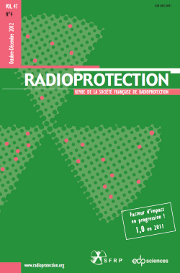Article contents
Long-term management of contaminated freshwater bodies and catchments. Decision making exercise with the MOIRA system
Published online by Cambridge University Press: 06 June 2009
Abstract
In the mid-long-term after a nuclear accident, the contamination of drinking water sources, fish and other aquatic foodstuffs, irrigation supplies and people's exposure during recreational activities may create considerable public concern, even though dose assessment may in certain situations indicate lesser importance than for other sources, as clearly experienced in the aftermath of accidents like Chernobyl. The MOIRA system is designed to allow for a reliable assessment of the long-term evolution of the radiological situation and of possible alternative rehabilitation strategies, including an objective evaluation of their social, economic and ecological impacts in a rational and comprehensive manner. MOIRA also features a decision analysis methodology, making use of multi-attribute analysis, which can take into account the preferences and needs of different types of stakeholders. A decision-making exercise regarding such problems, in which MOIRA has been be used as a decision support tool, was organised in Spain involving the organizations responsible for emergency management and the affected services, as well as local and regional stakeholders and several international observers. The system resulted very helpful in assessing the overall situation and the alternative management strategies and also facilitated the interaction between agencies which reached a better common understanding of all related issues.
Information
- Type
- Research Article
- Information
- Radioprotection , Volume 44 , Issue 5: ECORAD 2008 - Radioecology and Environmental Radioactivity , 2009 , pp. 683 - 688
- Copyright
- © EDP Sciences, 2009
References
- 5
- Cited by

